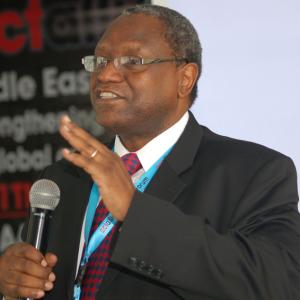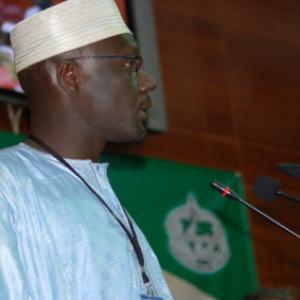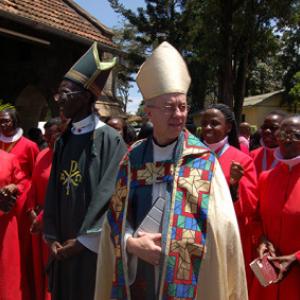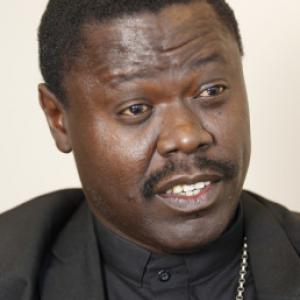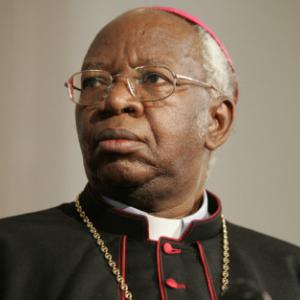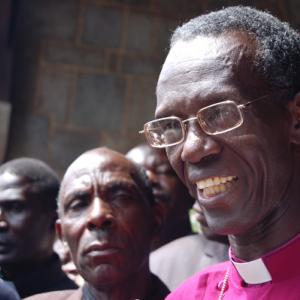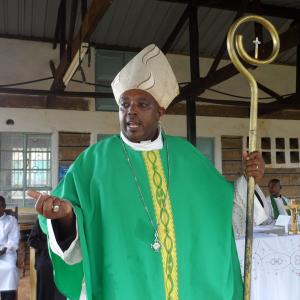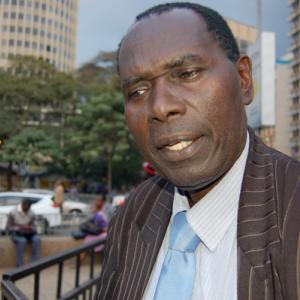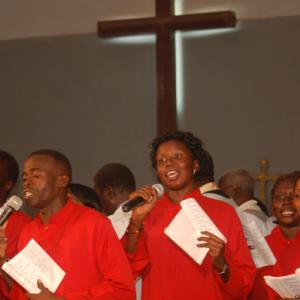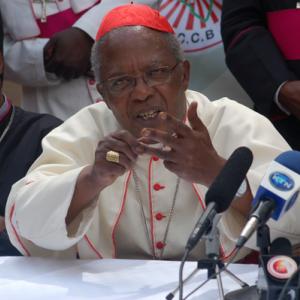Fredrick Nzwili is a journalist based in Nairobi, Kenya. For more than 15 years, he has written about religion, politics, peace and conflict, development, security, environment and wildlife. His articles have appeared in international media organizations among others; The Tablet, The Christian Science Monitor, The National Geographic and Kenyan local newspapers; The Standard and the People Daily.
Posts By This Author
Fewer Than 1,000 Muslims Left in Central African Republic Capital
As the number of Muslims in Bangui, the Central African Republic capital, dwindles to an estimated 900, the head of a global alliance of churches has urged tackling the conflict from a political rather than a religious angle if the Muslim exodus is to be reversed.
The alliance is one of the agencies providing humanitarian assistance in the country, where chaos erupted last year after the mainly Muslim rebels toppled the government.
The Seleka rebels looted, raped, and killed mainly Christian civilians, prompting the formation of an equally brutal pro-Christian anti-Balaka (anti-machete) militia.
African Church Leaders Resist Gay Rights, Call it a Colonial Import
A call for greater acceptance of gays and lesbians has put African and Western churches on a collision course, as some African clerics liken mounting criticism from the U.S. and Europe to a new wave of colonization by the West.
“Homosexuality is equivalent to colonialism and slavery,” said one participant.
“We feel it’s like a weapon of mass destruction,” said another.
“It is not biblical and cannot bring blessing to Christians,” said a third.
Gitonga, a powerful East African Pentecostal church official, is among a group of Kenyan leaders who have launched “Zuia Sodom Kabisa,” Kiswahili for “Stop Sodom Completely.” The campaign seeks 1 million signatures to petition legislation to criminalize homosexual acts in Kenya.
Bombs Explode Zanzibar Calm as Religious Tensions Flare
After months of calm in Zanzibar, two homemade bombs exploded Monday near St. Monica Anglican Cathedral and the Mercury restaurant, a popular hangout for tourists visiting the Indian Ocean archipelago.
No one was hurt, but one day earlier, four people were injured in another explosion, targeting an Assemblies of God church.
The attacks are blamed on the secessionist Uamsho, a religious group pressing for the full autonomy of the archipelago. Uamsho, which means “awakening” in Swahili, is also known as the Association for Islamic Mobilization and Propagation.
War-torn Churches Shelter Muslims in Central African Republic
Churches in Central African Republic are caring for thousands of Muslims who have been trapped in a cycle of revenge attacks, perpetrated by a pro-Christian militia.
Since December, Anti-Balaka militias have been emptying Muslim quarters and avenging earlier attacks by the Seleka, an Islamist militia. The Seleka rampaged through the country in early 2013, terrorizing Christians and ransacking churches, hospitals, and shops.
Now that the Muslim president Michel Djotodia has stepped down, Seleka is being forced to withdraw from its strongholds, as the center of power shifts, amid a mass exodus and displacement of Muslims.
Violence Against Muslims Soars in Central African Republic
African religious leaders are appealing for an end to violence against Muslims in the Central African Republic as thousands flee to neighboring Chad and Cameroon.
In recent weeks, a pro-Christian militia known as anti-Balaka (or anti-machete) has killed and mutilated Muslims as they have tried to leave the capital Bangui by the truckload.
Muslims had enjoyed some protection when Michel Djotodia, the country’s first interim Muslim president, was in power. Djotodia resigned under pressure in January and Catherine Samba-Panza was appointed the interim president.
Church of England's Call for Dialogue on Gays Rebuffed in Africa
Ahead of his five-day visit to Africa, Archbishop of Canterbury Justin Welby issued a statement reminding Anglicans of the commitment the Church of England made eight years ago to the pastoral care and support of everyone, including gays and lesbians.
So far, the archbishop’s statement has not convinced African leaders.
On Wednesday, Anglican leaders in Africa rejected a proposal by the English College of Bishops for two-year “facilitated conversations” to address the differences over homosexuality within the worldwide Anglican Communion.
In South Sudan Conflict, Churches Attacked, Looted
African church leaders are urging parties in the South Sudanese conflict to respect places of worship, after rebels attacked and looted church compounds in the town of Malakal.
The Roman Catholic Cathedral of Malakal was looted at gunpoint, forcing priests, and civilians to flee, a regional church leader said.
Catholic and Presbyterian churches, a hospital and an orphanage have become safe havens for refugees escaping the fighting in the city.
“I came to know myself what it means to be asked for something under the threat of a gun when a group in uniform stopped me on the way from the hospital to the church,” said one Catholic priest, who did not give his name because he fears for his safety. “They blocked me and took my watch and a key.”
Christians in the Sudan Face Travel Restrictions, Cardinal Says
For Christians living in predominantly Muslim Sudan, travel restrictions are making life more difficult each day, a Roman Catholic cardinal said.
Sudanese Cardinal Gabriel Zubeir Wako highlighted the challenges at a Catholic Bishops Conference in Juba, the Republic of South Sudan’s capital. His auxiliary bishop could not attend the Jan. 21-30 meeting because his passport was seized by security agents, along with those of eight priests.
“Christians in the two countries are facing difficulties,” Wako told the gathering. “We [bishops] must focus on serious matters and come up with strong messages.”
Humanitarian Aid Needed as Central African Republic Regroups
After months of violence in the Central African Republic, signs of hope emerged following Friday’s esignation of interim President Michel Djotodia and Prime Minister Nicholas Tiengaye.
But Roman Catholic Archbishop Nestor Desire Nongo-Aziagbia of Bossangoa said that although guns had gone silent, the crisis was far from over.
“The shooting has ceased, but the tensions are still there,” Nongo-Aziagbia said Monday. “Resignation is a first step towards solving the crisis.”
The resignations at a regional summit in neighboring Chad sparked wild celebrations among Christians in the capital, Bangui. The president was a Muslim.
Christians in Libya Cast Anxious Eye at Religious Freedom
Church leaders in Libya remain hopeful that Christians in the mostly Muslim country will be allowed to practice their faith, even as the country appears to be moving towards Shariah law.
In December, Libya’s General National Congress voted to make Shariah the source of all legislation and institutions. The vote came amid international concerns over the diminishing Christian populations in North Africa and the Middle East, and increased Islamist influence in countries engulfed by the Arab Spring revolution.
Libya has undergone a two-year transition since 2011 when demonstrations toppled Moammar Gadhafi. Before the revolution, Christians were granted religious freedom, but with the change of power, they have been arbitrarily arrested, attacked, killed, and forced by the Islamist groups to convert to Islam.
Fighting in Central African Republic Is Not About Religion, Archbishop Says
Two French soldiers died as a wave of deadly revenge attacks involving rival Christian and Muslim groups has left the Central African Republic in chaos.
But a Roman Catholic archbishop said the fighting pitting the two groups is not about religion, but rather politics and power.
“The religious leaders warned against this risk” of religious conflict, said Nestor Desire Nongo-Aziagbia of Bossangoa in a telephone interview. “Political leaders have not paid attention to these warnings. They wanted to antagonize the Central African Republic along religious lines in order to remain in power.”
Shaped by Methodists, Mandela Paid Tribute to Role of Religion
Nelson Mandela, the former South African president who died Thursday, had a deep connection with religious institutions.
Mandela was educated, first at Clarkebury and then at Healdtown, Methodist boarding schools that provided a Christian liberal arts education.
“Both were important influences on his life,” said Presiding Bishop Zipho Siwa of the Methodist Church of Southern Africa. “Indeed, after his time at Clarkebury, the young Mandela said his horizons had been broadened.”
In Cape Town, retired Anglican Archbishop Desmond Tutu said Mandela was mourned by South Africans, Africans, and the international community as a colossus of unimpeachable moral character and integrity.
“He preached a gospel of forgiveness and reconciliation,” Tutu wrote in a tribute on Allafrica.com.
Pentecostal Pastors in Africa Push Prayer, Not Drugs, for People with HIV
At prayer healing services in some Pentecostal churches, pastors invite people infected with HIV to come forward for a public healing, after which they burn the person’s anti-retroviral medications and declare the person cured.
The “cure” is not free, and some people say they shell out their life savings to receive a miracle blessing and quit taking the drugs.
“I believe people can be healed of all kinds of sickness, including HIV, through prayers,” said Pastor Joseph Maina of Agmo Prayer Mountain, a Pentecostal church on the outskirts of Nairobi. “We usually guide them. We don’t ask for money, but we ask them to leave some seed money that they please.”
But the controversial ceremonies are raising red flags as believers’ conditions worsen, and a debate has opened over whether science or religion should take the lead in the fight against the AIDS epidemic.
Teaching Congolese Refugees Self-sufficiency Gains Nun U.N. Recognition
Angélique Namaika, a Roman Catholic nun, rides a bicycle on the rutted roads of the Democratic Republic of Congo’s northeastern province of Orientale, which is plagued by rebel violence.
On these same roads, the Lord’s Resistance Army, a Christian rebel group led by Joseph Kony, a self-proclaimed prophet of God, has been killing, abducting, and mutilating women and children.
But none of that has deterred Sister Namaika from helping displaced women learn trades, start small businesses, and go to school.
Excommunicated Bishop Still Sees Himself as Roman Catholic
Excommunicated Zambian Archbishop Emmanuel Milingo, who advocates for married priests within the Roman Catholic Church, said he has not split from Rome though many of the priests he ordained no longer see themselves as part of the church.
“We are not a breakaway church,” said Milingo, who married Maria Sung, a Korean acupunturist, in 2001. “Within the Catholic Church married priests existed for a thousand years.”
10 Years After Gene Robinson, African Anglicans Take Stock
Concerned that the crisis in the worldwide Anglican Communion is deepening, conservative Anglican primates in Africa are organizing a second conference to discuss ways of returning the church to what they describe as biblical faithfulness.
The primates held the first conference in Jerusalem in 2008, five years after openly gay New Hampshire Bishop Gene Robinson was consecrated in the Episcopal Church. The action threw the communion into disarray.
At the Jerusalem meeting, the primates called for the creation of an Anglican province in North America to rival the Episcopal Church. Five years later, the primates say the new Anglican province, known as the Anglican Church in North America, is thriving.
Schismatic African Priests Want a Pope to Call Their Own
Schismatic Roman Catholic priests, who left the church to claim their right to marry, are now asking for an “African pope” to lead them.
The priests say they regret their former church is “allergic” to change. They believe priestly celibacy is neither rooted in the teachings of Jesus nor in the work of his apostles, who were married. And they insist celibacy does not work in an African context.
Former Zambian Archbishop Emmanuel Milingo who married a Korean acupuncturist in a 2001 celebration sponsored by the Unification Church and presided by its late founder, the Rev. Sun Myung Moon, serves as “African patriarch” of a number of church groups affiliated with his movement.
Kenyan Lawyer on Quixotic Quest to Nullify Trial of Jesus
The conviction of Jesus by Pontius Pilate may be the most famous court verdict ever — and perhaps the most consequential, since it led to Christ’s crucifixion and the founding of a global religion.
Now a Kenyan lawyer wants to overturn Pilate’s decision, though he wants to keep the faith that flowed from it.
“The selective and malicious prosecution (of Jesus) violated his human rights,” said Dola Indidis, a Roman Catholic who is petitioning the International Court of Justice, based at The Hague, to nullify Jesus’ conviction and death sentence.
Christians in Sudan Face Increased Hostility
Despite a promise by the Sudanese government to grant its minority Christian population religious freedom, church leaders there said they are beset by increased restrictions and hostility in the wake of the South Sudan’s independence.
In 2011, South Sudan, a mostly Christian region, split from the predominantly Muslim and Arab north, in a process strongly supported by the international community and churches in the West.
The two regions had fought a two-decade long civil war that ended in 2005, following the signing of the Comprehensive Peace Agreement. The pact granted the South Sudanese a referendum after a six-year interim period and independence six months later. In the referendum, the people of South Sudan chose separation.
African Religious Leaders Reject Obama’s Call to Decriminalize Homosexuality
Religious leaders in Africa strongly rebuked President Obama’s call to decriminalize homosexuality, suggesting it’s the reason why he received a less-than-warm welcome during a recent trip to the continent.
In a news conference in Senegal during his three-nation tour, just as the U.S. Supreme Court struck down a federal ban on same-sex marriage, Obama said African nations must grant equal protection to all people regardless of their sexual orientation.
“My basic view is that regardless of race, regardless of religion, regardless of gender, regardless of sexual orientation, when it comes to how the law treats you, how the state treats you … people should be treated equally,” Obama said. “And that’s a principle that I think applies universally.”
